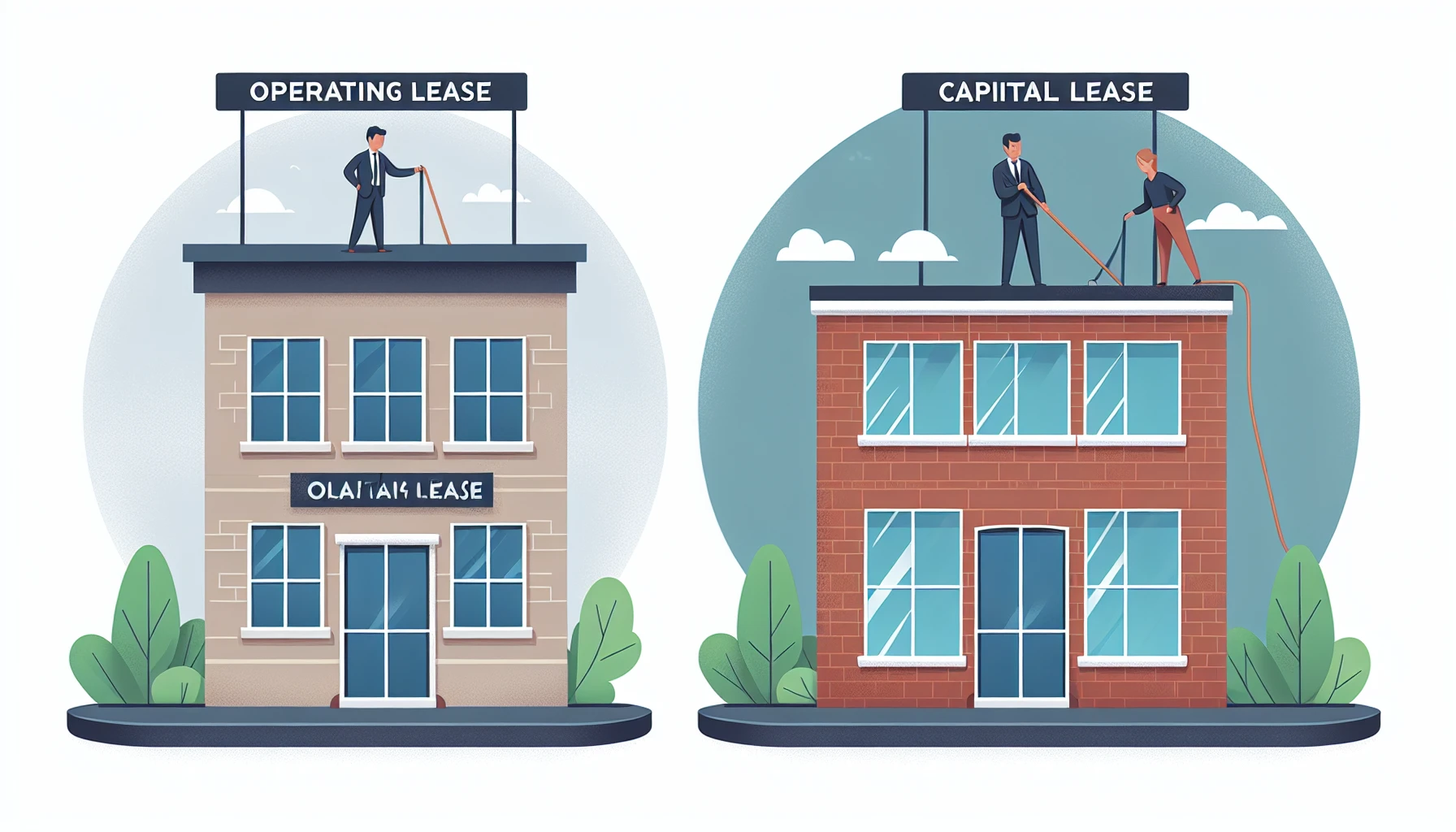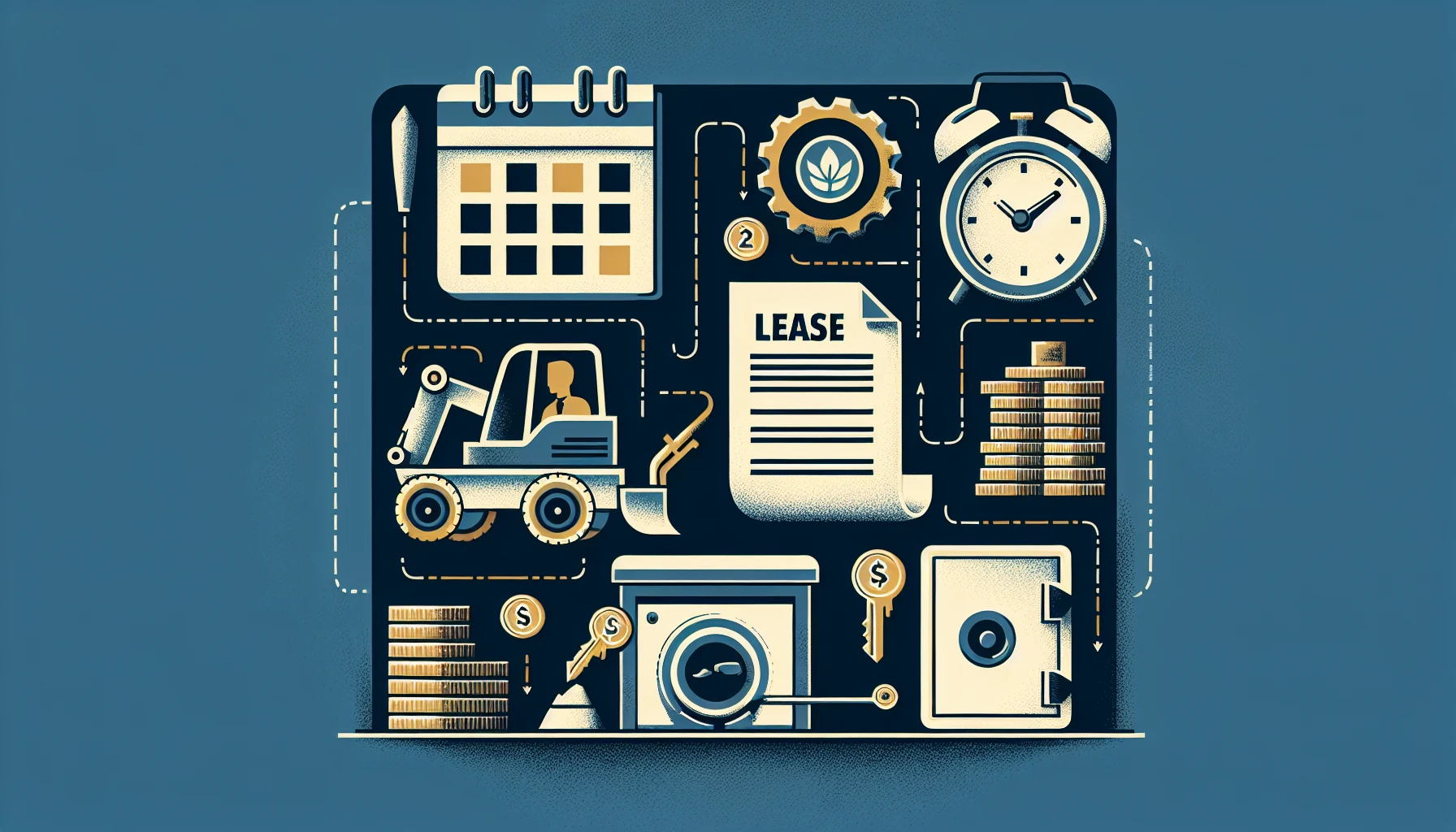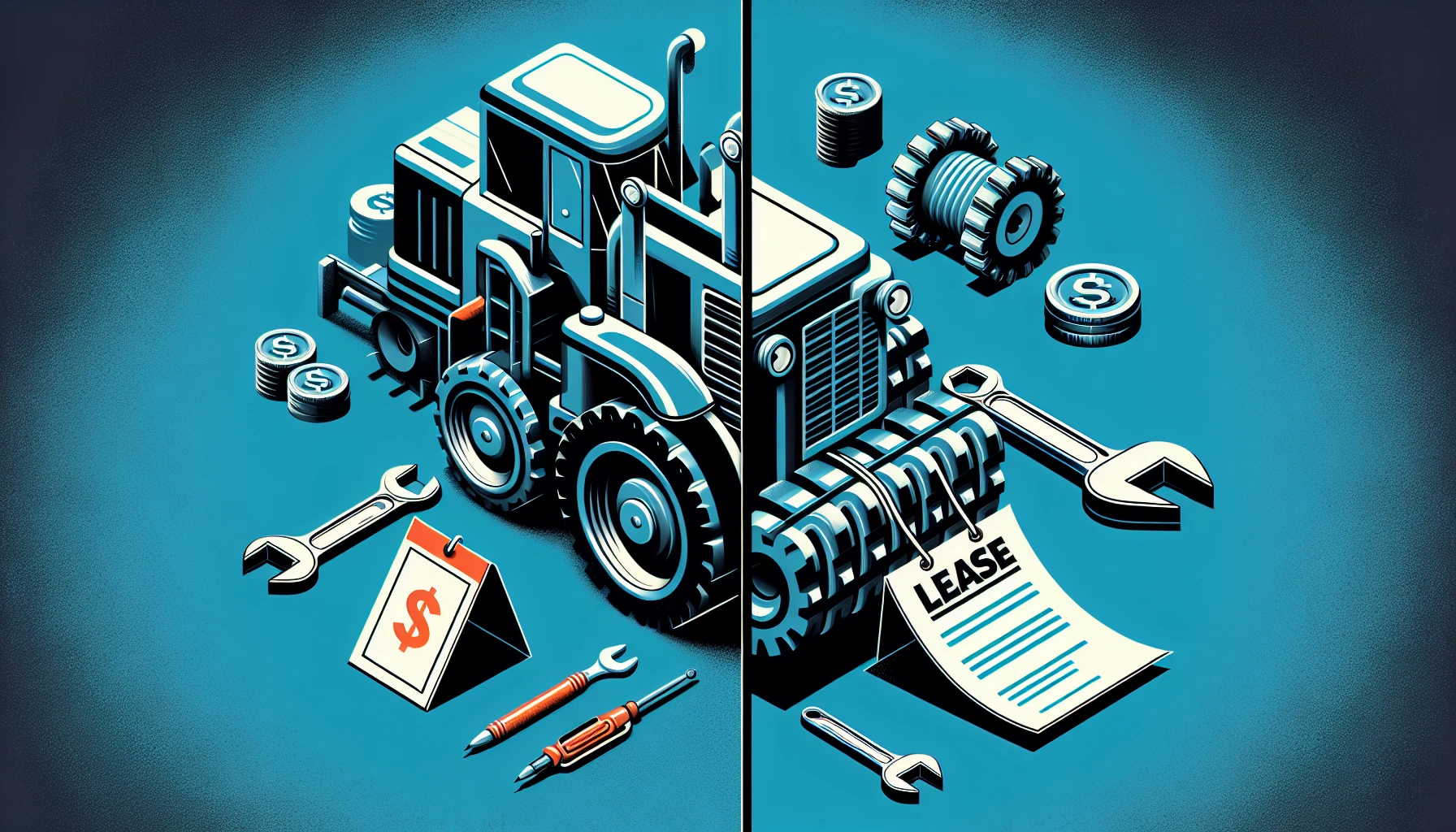In today’s competitive business landscape, having the right equipment can make all the difference in maintaining efficiency and staying ahead of the curve. Equipment lease offers an attractive alternative to purchasing equipment outright, allowing businesses to access state-of-the-art tools while preserving capital and enhancing flexibility. This comprehensive guide will walk you through the ins and outs of equipment lease, from understanding the basics to evaluating potential providers and exploring financing options.
Key Takeaways
- Equipment leasing provides businesses access to up-to-date technology, reduced costs, and improved cash flow.
- There are two main equipment leases: operating and capital leases, each offering distinct benefits for different needs.
- Businesses should evaluate all aspects carefully before agreeing to make the most suitable decision for their long-term goals.
Understanding Equipment Leasing

Equipment leasing is a popular choice among companies of all sizes, providing the opportunity to make regular lease payments and utilize equipment for an allotted amount of time without paying the full cost upfront. This method allows business resources to be allocated towards business growth rather than paying considerable expenses toward purchasing equipment. Several players in this industry provide great benefits plus specialized knowledge, such as distributors, dealers and independent leasing organizations.
This process has many perks that should not go unnoticed by small or large enterprises. They have access to modern technology while controlling costs associated with maintenance issues and safeguarding their capital flow expenditures. Studies suggest nearly eighty percent of U.S.-based firms opt for Equipment Leasing instead of direct purchase when considering investing in commercial machinery investments.
The Basics of Equipment Leasing
Leasing equipment is ideal for businesses looking to reduce their initial acquisition costs. It involves the contractual agreement between a lessee and an owner, where periodic payments are exchanged for using said equipment. An Equipment Lease Agreement usually contains details such as a description & duration of the lease, payment arrangements, and terms/conditions. Financial responsibilities are split amongst both parties involved, etc.
Various distributors, dealers, and independent leasing companies can assist with this process, allowing businesses from different industries access to exactly what they need - be it heavy machinery in construction or specialized tools used by manufacturers - thanks to versatile leases that accommodate varying requirements within them all!
Reasons for Choosing Equipment Leasing
Businesses may lease equipment instead of buying it for various advantages, such as preserving cash flow and reducing maintenance costs. Small business owners with limited funds can acquire the necessary items without any down payment or long-term commitment thanks to leasing’s lower initial expenditure than outright purchasing. Leases offer economic flexibility, too, by having decreased monthly payments by acquiring costly apparatus directly.
Renting expensive machinery enables companies to keep up with modern trends and access fresh technology while avoiding expenses associated with buying and maintaining the tools, allowing them to upgrade when needed so they keep being effective plus aggressive in their fields.
Types of Equipment Leases: Operating vs. Capital

When engaging in an equipment leasing agreement, businesses should know the two main types: operating and capital leases. These different kinds of leases present distinct features and advantages that must be considered before settling on one option. For instance, with an operating lease, the lessor owns the equipment while maintaining it. Yet a capital lease provides long-term use and responsibility for upkeep, insurance costs, and taxes falling onto the lessee’s shoulders.
Comprehending how both options vary can help companies make informed decisions regarding acquiring or renting out any necessary items they might require - like assessing usage levels along with financial implications/maintenance fees that have been incurred already due to ownership by being leased from outside parties, etc. Taking these matters seriously could prove beneficial in finding a type of leasing arrangement that works best according to their specific needs instead of just going blindly without understanding all related aspects first.
Operating Leases Explained
Operating leases offer businesses a flexible solution for short-term equipment needs and the ability to lower costs associated with ownership. The lessor will own the machinery, handle maintenance duties, and keep contract lengths from 12 to 36 months at an APR rate of 5% or less. With this arrangement, companies have greater control over their obligations and can terminate lease agreements early should they need flexibility without sacrificing all payments thus far made into it. That does affect its financial ratios due to liabilities entering balance sheets as related assets do. Operational leasing also allows firms access to necessary tools while allowing them room amidst changing business dynamics regarding size/scope, etc.
Capital Leases Explained
Businesses can gain the advantage of leasing expensive equipment if they lack the funds to buy outright through capital leases. These arrangements assign the lessee responsibility for maintenance, insurance, and taxes, along with a potential purchase option at expiration. Though these leases have several benefits, including asset depreciation allowance and accrued interest expense, associated costs and risks need consideration before agreeing, such as non-deductible payments counted towards debt amounting from said lease agreements. Businesses must thoroughly assess all pros/cons before signing on any capital lease arrangement involving their desired equipment or assets.
The Financial Perks of Leasing Lift Trucks

Leasing equipment can be a great way for businesses to acquire the necessary technology without requiring large upfront costs. Business owners must understand all the elements outlined in an equipment lease agreement, including terms and payment specifics and potential additional fees such as taxes or insurance costs that could affect their total cost. It should also be noted that penalties may apply if payments are late or there is an early termination. Understanding those details within your agreement can help you make informed decisions when leasing equipment. All these components combine into a cohesive unit that defines the expectations between the lessee and the lessor during any given rental period. Full knowledge about them will ensure smooth sailing throughout your leasing duration!
Financing Options for Equipment Leasing
Businesses seeking equipment leasing have many different financing options at their disposal. These can include traditional business loans, term loans, SBA loans, or lines of credit, just a few possibilities. Each option offers unique advantages and restrictions, which should be carefully considered to decide the most suitable choice for each situation.
Banks are often thought to provide the best deals when funding an equipment lease, largely because they usually offer lower fees than other financing providers today. Businesses might also want to look into invoice factoring and alternative methods, such as specialized companies, allowing them to access cash flow to finance their leases easily.
Equipment Finance is yet another way to secure funds necessary for more extensive machinery — allowing those who use this method greater flexibility and potentially much better terms compared with conventional forms of borrowing from banks or lending institutions too!
Evaluating Equipment Leasing Providers
For businesses looking for an equipment leasing provider, there are several things to consider, such as expertise, credibility, and the range of available gear. There are three main categories into which lease suppliers can be sorted: brokers, companies, or independent lessors, with their advantages and disadvantages. Before signing any equipment lease agreement, these firms must do some research by comparing various leases from different providers. Investigate each one’s record properly. Contact existing/past customers to check if they had any negative experiences so everything runs smoothly when finalizing agreements.
Lease Brokers
Lease brokers act as intermediaries between businesses and lessors, managing all the paperwork required to make an offer for those seeking equipment leases. With connections to numerous retailers, manufacturers, and lenders who can finance such acquisitions or rentals at a competitive rate, companies can access more options in acquiring lease equipment. However, these services come with fees ranging from two to four percent depending on the equipment's cost. It is often worth opting for this route as there are multiple advantages gained by availing their services – expert knowledge when negotiating favorable leasing contracts and extensive network contacts helping cut costs long-term, thereby saving businesses both time & money!
Leasing Companies
Leasing firms have affiliations with equipment dealers or manufacturers, enabling them to furnish competitive rates and relevant knowledge about the apparatus they offer by maintaining ties with manufacturers, retailers, and lenders who finance leases/purchases of such gear. These leasing companies can be instrumental in providing businesses with exactly what they need. Because leasing services may involve aspects like real estate deals, salesmanship, and customer care expertise – it makes sense for businesses looking into leasing options to properly assess a company’s credibility plus proficiency before signing any agreement.
Partnering up with a reputable firm involved in making arrangements around certain types of lease could bring benefits such as increased cash flow opportunities alongside an uncomplicated financing process, including access to more advanced devices requiring minimal upfront costs initially on behalf of the lessee(business). Hence, all details should be considered carefully when choosing among various suitable parties offering similar contracts related to the same setup.
Independent Lessors
Businesses can acquire equipment leases from third-party providers such as banks and independent lenders. These leasing specialists are known for providing competitive rates with the advantage of being highly experienced in remarketing used or repossessed gear, ensuring maximum value by finding new users or buyers via consultants, brokers, etc.
On the flip side, though, some may not have access to all the same resources that a manufacturer/dealer-associated lease company would possess. That said, these independents tend to prioritize customer service, which allows them to form lasting relationships with their clients, so overall, they remain an optimal choice when selecting an effective supplier of rental equipment services and solutions for business needs.
Navigating Lease-to-Own Agreements

Businesses may choose to use a lease-to-own agreement as an alternative to traditional equipment leasing, though there can be higher costs and risks associated with these contracts. With such an arrangement, businesses are responsible for making regular payments to gain ownership of the expensive equipment they will eventually need. If all payment obligations cannot be met by the end of their contract, then forfeiting any existing payments is a risk that must also be considered when selecting this option. It’s critical for enterprises engaging in lease arrangements like these to consider both sides before signing a contract, understanding potential expenses and drawbacks while ensuring long-term acquisition goals align with optimal financing methods given current circumstances.
Equipment Leasing vs. Buying

When contemplating whether to purchase or lease equipment outright, businesses should consider factors such as the duration of use and upkeep costs, possible obsolescence, and associated fiscal outcomes.
Leasing can enable improved cash flow with access to modern technology, but buying could have a tax depreciation advantage plus longer-term expense savings.
Ultimately, each business’s requirements & financial position will decide which route is chosen - by looking at budgeting, maintenance costs & eventual outdating possibilities. Companies can make decisions that align with their extended plans and aims.
Lessee Responsibilities and Additional Costs
When it comes to equipment leasing, businesses need to be aware of the extra expenses and obligations that come with an agreement. This may include maintenance fees, insurance premiums, or penalties for early termination or overdue payments. To avoid any unforeseen troubles, a thorough lease agreement review is paramount for companies before signing on the dotted line. Looking over all terms and conditions in detail and being aware of what costs they will have to take care of during their lease period can help ensure smooth sailing when engaging in a contract concerning equipment leases.
Summary
Equipment leasing is an efficient and cost-effective solution for businesses looking to acquire the necessary equipment without incurring any upfront expenses or enduring a long-term commitment. By understanding its fundamentals, researching potential providers, exploring finance options, and considering lease terms carefully, they can enjoy all of the leasing benefits while minimizing the associated risks. Due to ever-changing conditions in the business world, utilizing this form of financing for required assets has become critical for success.
Frequently Asked Questions
What is an equipment lease?
An agreement between the owner and user of the equipment, known as an equipment lease, involves granting permission to use said pieces of machinery in exchange for regular payments spread out over a given timeline.
What is the average rate for an equipment lease?
A leasing expert is the best source of information to get detailed terms for an equipment lease. Typically, these are accompanied by interest rates between 7 and 13% annually.
Is equipment lease an asset or an expense?
Leases for equipment considered operating leases do not need to be registered as a liability; the expense is accounted for instead. Longer-term lease contracts can count towards an asset, but shorter-term ones go into expenses. Operating leases associated with equipment should always stay at the top of mind when budgeting appropriately.
Is it better to lease equipment?
Leasing equipment can be smart when you need the gear for short periods or are running on limited finances since there’s no hefty outlay and cost savings involved.
What is the equipment used in construction?
Earth-moving equipment such as bulldozers, excavators, backhoes, compact track loaders, skid steers, and motor graders perform construction-related tasks like digging trenches or holes, removing buildings, and leveling the ground—clearing brush, etc. Trenchers also fall into this category of machinery for executing these same jobs.
